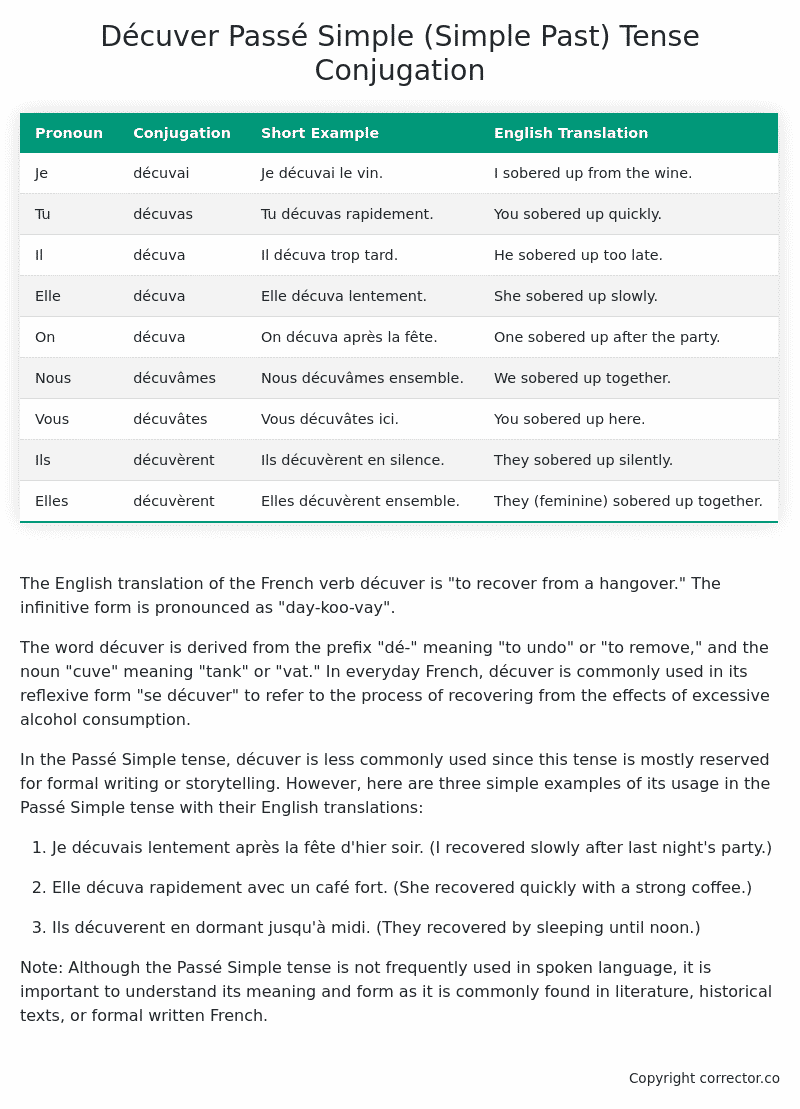Passé Simple (Simple Past) Tense Conjugation of the French Verb décuver
Introduction to the verb décuver
The English translation of the French verb décuver is “to recover from a hangover.” The infinitive form is pronounced as “day-koo-vay”.
The word décuver is derived from the prefix “dé-” meaning “to undo” or “to remove,” and the noun “cuve” meaning “tank” or “vat.” In everyday French, décuver is commonly used in its reflexive form “se décuver” to refer to the process of recovering from the effects of excessive alcohol consumption.
In the Passé Simple tense, décuver is less commonly used since this tense is mostly reserved for formal writing or storytelling. However, here are three simple examples of its usage in the Passé Simple tense with their English translations:
-
Je décuvais lentement après la fête d’hier soir.
(I recovered slowly after last night’s party.) -
Elle décuva rapidement avec un café fort.
(She recovered quickly with a strong coffee.) -
Ils décuverent en dormant jusqu’à midi.
(They recovered by sleeping until noon.)
Note: Although the Passé Simple tense is not frequently used in spoken language, it is important to understand its meaning and form as it is commonly found in literature, historical texts, or formal written French.
Table of the Passé Simple (Simple Past) Tense Conjugation of décuver
| Pronoun | Conjugation | Short Example | English Translation |
|---|---|---|---|
| Je | décuvai | Je décuvai le vin. | I sobered up from the wine. |
| Tu | décuvas | Tu décuvas rapidement. | You sobered up quickly. |
| Il | décuva | Il décuva trop tard. | He sobered up too late. |
| Elle | décuva | Elle décuva lentement. | She sobered up slowly. |
| On | décuva | On décuva après la fête. | One sobered up after the party. |
| Nous | décuvâmes | Nous décuvâmes ensemble. | We sobered up together. |
| Vous | décuvâtes | Vous décuvâtes ici. | You sobered up here. |
| Ils | décuvèrent | Ils décuvèrent en silence. | They sobered up silently. |
| Elles | décuvèrent | Elles décuvèrent ensemble. | They (feminine) sobered up together. |
Other Conjugations for Décuver.
Le Present (Present Tense) Conjugation of the French Verb décuver
Imparfait (Imperfect) Tense Conjugation of the French Verb décuver
Passé Simple (Simple Past) Tense Conjugation of the French Verb décuver (You’re reading it right now!)
Passé Composé (Present Perfect) Tense Conjugation of the French Verb décuver
Futur Simple (Simple Future) Tense Conjugation of the French Verb décuver
Futur Proche (Near Future) Tense Conjugation of the French Verb décuver
Plus-que-parfait (Pluperfect) Tense Conjugation of the French Verb décuver
Passé Antérieur (Past Anterior) Tense Conjugation of the French Verb décuver
Futur Antérieur (Future Anterior) Tense Conjugation of the French Verb décuver
Subjonctif Présent (Subjunctive Present) Tense Conjugation of the French Verb décuver
Subjonctif Passé (Subjunctive Past) Tense Conjugation of the French Verb décuver
Subjonctif Imparfait (Subjunctive Imperfect) Tense Conjugation of the French Verb décuver
Subjonctif Plus-que-parfait (Subjunctive Pluperfect) Tense Conjugation of the French Verb décuver
Conditionnel Présent (Conditional Present) Tense Conjugation of the French Verb décuver
Conditionnel Passé (Conditional Past) Tense Conjugation of the French Verb décuver
Conditionnel Passé II (Conditional Past II) Tense Conjugation of the French Verb décuver
L’impératif Présent (Imperative Present) Tense Conjugation of the French Verb décuver
L’impératif Passé (Imperative Past) Tense Conjugation of the French Verb décuver
L’infinitif Présent (Infinitive Present) Tense Conjugation of the French Verb décuver
L’infinitif Passé (Infinitive Past) Tense Conjugation of the French Verb décuver
Le Participe Présent (Present Participle) Tense Conjugation of the French Verb décuver
Le Participe Passé (Past Participle) Tense Conjugation of the French Verb décuver
Struggling with French verbs or the language in general? Why not use our free French Grammar Checker – no registration required!
Get a FREE Download Study Sheet of this Conjugation 🔥
Simply right click the image below, click “save image” and get your free reference for the décuver Passé Simple tense conjugation!

Décuver – About the French Passé Simple (Simple Past) Tense
Formation
Usage
Narration
Historical Context
Interactions with other tenses
Passé Composé
Imparfait
Conditional and Subjunctive
Summary
I hope you enjoyed this article on the verb décuver. Still in a learning mood? Check out another TOTALLY random French verb conjugation!


